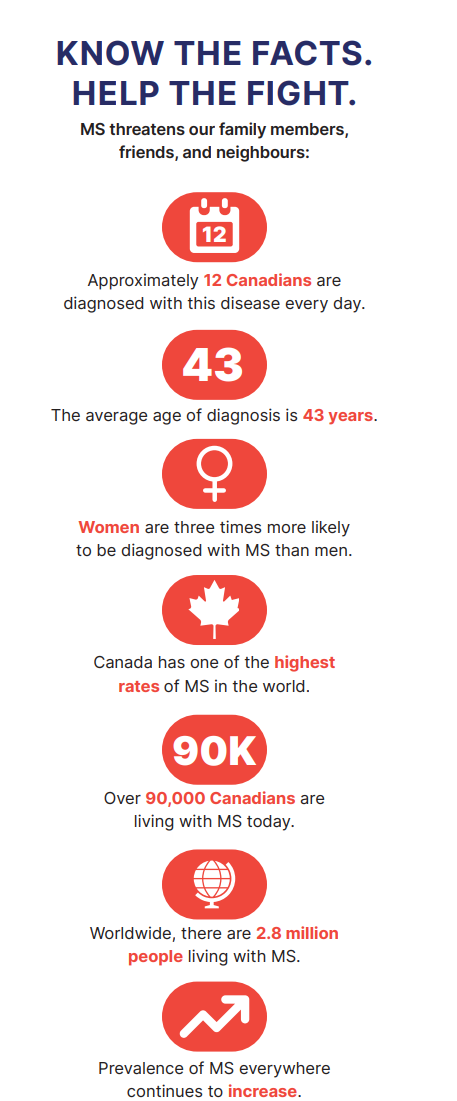- Research
- November 15, 2023
MS Progress Report
Fall 2023
When fear makes you stronger: Meet Kyle Peterson

After enduring symptoms of pins and needles accompanied by complete numbness and loss of strength, Kyle Peterson knew something was wrong. At just 32 years old, he discovered he had multiple sclerosis (MS). This diagnosis would change his life in many unexpected ways.
“When the doctor said, ‘You have MS,’ I instantly thought life as I knew it was over. I became very sad and frightened,” Kyle says. "It took me almost a year to get over the shock and fear of learning my diagnosis. It was overwhelming and scary every time it felt like my body was changing with every new symptom.”
Since his diagnosis 14 years ago, Kyle has encountered a handful of difficult MS-related episodes. At times, his daily hour-long walks were reduced to five challenging minutes on the treadmill. At one point, he even had to stop working and couldn’t drive. Each relapse reminds him that life with MS is unpredictable and can change in an instant.
But Kyle’s uncertainty soon turned to strength.

“I have MS, but I’m not going to let MS have me.”
“There is a strength inside me I didn’t even know I had,” says Kyle. “MS was the catalyst I needed to stop sitting on the sidelines watching life pass me by — it forced me to start living.”
Kyle was able to tap into the resilience that MS had given him to change his mindset. “I realized I had been focusing on all the things that I couldn’t do. It wasn’t until I changed my way of thinking that I was able to see just how much I could do,” he says.
Now, Kyle takes the advice his mother gave him and considers every day to be a gift. He enjoys the outdoors and loves boating, swimming, hiking, and cooking. Kyle also participates in Walk MS every year to raise funds for MS Canada.
When asked if he had any advice for anyone living with MS, Kyle said: “Listen to your body. It will let you know that maybe you’re doing too much and you need to rest and that is okay. MS is as much a mental challenge as a physical one, it is important to keep yourself upbeat and positive. When you are going through a relapse, know that this too shall pass and things will get better.”
Research Spotlight: Dr. Anthony Feinstein
“What I enjoy most about research is trying to be innovative. While I recognize that replication is of course important and essential, coming up with new findings which can affect the quality of patient care is rewarding.”

Dr. Feinstein is a Professor of Psychiatry at the University of Toronto. He has a PhD and a master’s degree from the University of London, England. His expertise and research focus on the neuropsychiatry of MS. Neuropsychiatry of MS is best explained as the behavioral effects of the disease. Dr. Feinstein has researched behavioral disorders in people with multiple sclerosis for 26 years and runs a busy clinical practice in which over 80% of the patients have MS.
There are currently no effective disease-modifying therapies for people with secondary progressive MS who no longer experience relapses and only one therapy approved for early primary progressive MS in Canada. Along with his research team, Dr. Feinstein aims to develop rehabilitation strategies that help people with MS manage their symptoms, such as cognitive dysfunction. Cognitive dysfunction is considered an ‘invisible’ symptom of MS that can affect up to 70% of people with progressive MS and has been recognized as an area of prime concern by people with MS — given the considerable impact it can have on employment, relationships, and daily activities.
To identify a potential treatment for cognitive difficulties experienced by people living with progressive MS, Dr. Anthony Feinstein and his international team of investigators are testing if cognitive rehabilitation, exercise, or a combined approach of cognitive rehabilitation and exercise will improve cognitive function.
We just received new results from Dr. Feinstein’s work that show us that cognition can be improved in people living with progressive MS.
Researchers found that two-thirds of all trial participants showed an improvement in information processing speed after cognitive rehab and/or aerobic exercise. And almost half of them still showed these improvements after 6 months. Dr. Feinstein’s work has the potential to change countless lives around the world — and to help make MS a thing of the past. We are so thankful to you for helping drive progress through research like this.
Give once a month. Make an impact every day.

- Easy: Set up your monthly gift in minutes and change it at any time.
- Convenient: No more stamps or envelopes, just make your selections and you’re done.
- Rewarding: You’ll feel good knowing you’re helping Canadians living with MS, 365 days a year.
A Potential MS Therapeutic that Enhances Repair and Regeneration in MS
A defining characteristic of MS pathology is the loss of myelin. Myelin is a fatty substance that protects nerve cells and acts to enhance their signal transmission. Disease-modifying treatments for MS exist, but are only effective in treating relapse-remitting forms of MS. One strategy to treat progressive MS involves facilitating remyelination, the process of restoring damaged myelin.
Dr. Anastassia Voronova and research team at the University of Alberta have previously shown that a molecule called fractalkine can enhance remyelination by increasing the production of myelin forming cells in the brain. Dr. Voronova’s study focuses on uncovering the therapeutic potential of fractalkine using a mouse model of MS.
If successful, results from her study may shed light on the underlying molecular mechanisms involved in brain repair and can form the basis of remyelination treatments for MS.
Message from President and CEO, Dr. Pamela Valentine

This year, we have seen some of the most groundbreaking research projects brought to life. I am eager to see how these discoveries will change the lives of Canadians living with MS. As a proud supporter of MS Canada, I know you are dedicated to sustaining this progress in the years to come. Thank you for helping us bring our mission to life.
As you know, Canada has one of the highest rates of MS in the world. To me, this is all the more reason to be at the forefront of the pursuit to end MS. We have the knowledge and resources to advance so many promising research projects — and we won’t slow down now. Together, we can make a difference for people facing MS in Canada and beyond.
You may have noticed we now go by the name ‘MS Canada’. This comes from the integration of MS Society of Canada with MS Scientific Research Foundation, which took effect at the beginning of the year. You might have also noticed our bold and bright new look. Though some small things about MS Canada have changed, our vision remains the same: To create a world free of MS.
Together, we can reach new heights for our fellow Canadians living with MS. I know that with steadfast supporters like you on our side, there is no limit to what we can achieve. Thank you so much for your kindness.
Sincerely,
Dr. Pamela Valentine
President and Chief Executive Officer
MS Canada
Promoting Central Nervous System Remyelination: What You Need to Know
Like Dr. Voronova, Dr. Carlos Camara-Lemarroy from the University of Calgary is also studying ways to promote remyelination in MS in hopes of understanding and halting disease progression. Dr. Camara-Lemarroy’s research includes determining whether remote ischemic preconditioning (REIP) promotes remyelination in MS.
REIP is a non-pharmacologic intervention that has been shown to be neuroprotective in pre-clinical and clinical studies of central nervous system (brain and spinal cord) injury. It has already been deemed safe and tolerable in humans. REIP works by blocking the blood flow of a limb (arm or leg) for short periods of time using a blood pressure cuff, which tricks the body into producing substances, such as immune factors, growth factors or tissue protective factors — that could be helpful in promoting remyelination.
Dr. Camara-Lemarroy and team aim to determine the remyelination potential and mechanism of REIP in mice with MS-like disease as well as test REIP in people with MS. If found to be effective at promoting remyelination in animal models and ultimately, humans, REIP could be a safe, inexpensive, non-pharmacologic intervention for people living with MS.
For the sake of those we love, we must continue pushing for progress. Thank you for your support as we help people with MS live their best lives.
Read past editions of the Progress Report to learn about the work that brought us here today.
- Log in to post comments

